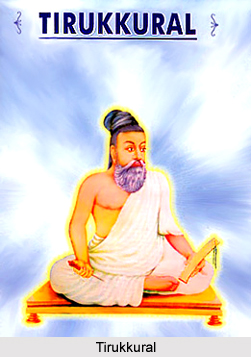 Tirukkural also known as the Kural is a classic of couplets or aphorisms or Kurals composed in Tamil by Thiruvallur, who lived between the 2nd century AD and 6th century AD. It is one of the finest pieces of literature that has been produced by India. Tirukkural expounds on various aspects of life and is one of the most important works in the Tamil language. Even though exact period of its formation is doubtful, it was agreed upon by various scholars that Tirukkural was composed during the late Tamil Sangam period. It is also known as Poyyamozhi Tamil Marai and Daiva Nool. Tirukkural is believed to precede the two epics in Tamil literature titled Cilappatikaram and Manimekalai, as both of them recognize the Kural text.
Tirukkural also known as the Kural is a classic of couplets or aphorisms or Kurals composed in Tamil by Thiruvallur, who lived between the 2nd century AD and 6th century AD. It is one of the finest pieces of literature that has been produced by India. Tirukkural expounds on various aspects of life and is one of the most important works in the Tamil language. Even though exact period of its formation is doubtful, it was agreed upon by various scholars that Tirukkural was composed during the late Tamil Sangam period. It is also known as Poyyamozhi Tamil Marai and Daiva Nool. Tirukkural is believed to precede the two epics in Tamil literature titled Cilappatikaram and Manimekalai, as both of them recognize the Kural text.
Tirukkural consists of 1330 rhyming Tamil couplets that have been divided into 133 chapters. Each chapter deals with a specific subject. These couplets are arranged into three main sections and 133 chapters and each chapter contains 10 couplets. A couplet comprises of 7 cirs, where 4 cirs are on the first line and 3 cirs on the second line. A cir is a single or an amalgamation of more than one Tamil word. Each chapter contains a specific subject which range from ploughing a piece of land to ruling a country. The book advocates truth and simplicity through out its poetry. Kural, which is a Tamil word, means short verse and is characterized by the Venpa meter which consists 2 lines. Tirukkural falls under 1 of the 4 categories of Venpas called Kural Venpa. This composition has been translated into various other languages.
There are other names by which Tirukkural (Thirukural) is known such as Uttravedam, Poyyamozhi, Vayurai vazhthu, Teyvanul, Pothumarai, Muppal and Tamil marai. Each chapter contains ten couplets and has been grouped into three sections: Aram, Porul and Inbam. The Aram section consists of 380 verses, Porul comprises of 700 and Inbam consists of 250 verses. Aram and Inbam speaks about ethical living in private life, Porul speaks about public matters.













